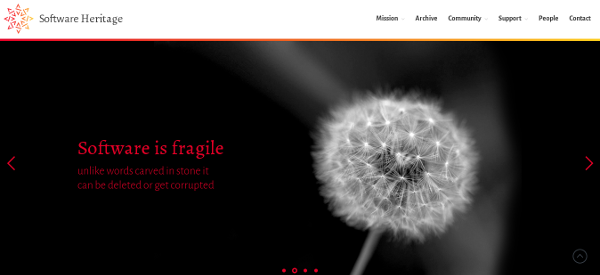Inria announces Software Heritage
Yesterday Inria, the French National Institute for computer science and applied mathematics, announced (French press release. Ed.) the launch of Software Heritage, an initiative collect, organise, preserve and make easily accessible the source code of all software that is publicly available.

Sending messages to family and friends, paying bills, purchasing goods, accessing entertainment, interacting with central and local government, finding information, booking travels: nowadays almost every act of our daily life relies on computers and software.
However, that is just the tip of the iceberg. Software controls the electronic equipment embedded in the machines we use to travel, communicate, trade and exchange. Software lies at the heart of medical equipment and devices; it ensures proper operation of the energy, transport and telecommunication networks; it powers the banks and financial institutions; software is crucial for the working of large public and private organisations of all sizes, be that on mobile devices or in the cloud.
In summary, software is a key enabler for all aspects of our modern world: our industry, our science, our lifestyle; all of our society depends on software.
The challenge
The goal of the Software Heritage project is to build a modern “Library of Alexandria” featuring software, which will form a unique reference database of all source code, a tool for new software projects and a research instrument for computer science.
Software Heritage is an essential building block for preserving, enhancing and sharing the scientific and technical knowledge that is embedded to an ever-greater extent in software; it also contributes to our ability to access all the information stored in digital form.
Software Heritage will adopt a distributed infrastructure in order to ensure the long-term availability and reliability of its archive.
Software Heritage will provide a reference knowledge base for all open source software used in industry, thus enabling better lifecycle management and long term preservation of industrial software. Once live update capabilities are enabled, Software Heritage is bound to become the reference archive for all industrial users, helping software developers of new software projects find, re-use and archive new source code.
Software Heritage is the foundation on which we can build a unique research instrument for studying all the software source code, enabling significant advances in all domains of computer science and leading to better quality, security and safety in the software on which we depend in our daily lives.
As of yesterday when the project was announced, Software Heritage had already collected more than 20 million software projects, archiving more than 2.5 billion unique source files, along with all their development history. Software Heritage therefore represents the richest collection of source code on the planet.
Antoine Petit, INRIA’s CEO, remarked: “We decided to start working on Software Heritage more than a year ago and we have now shown its feasibility. In order to scale up worldwide, the time has now come to open it up to the widest, national and international contributions.”
Two early partners have already committed their support to Software Heritage and will help it grow. They are Microsoft, (which really needs no introduction. Ed.) and DANS, an institution of the Royal Academy of the Arts and Sciences and the Netherlands Organisation for Scientific Research, dedicated to preserving and promoting sustained access to digital research data.
Inria is now calling all stakeholders worldwide to assist the project in tasks such as, for example, helping to identify the thousands of different sites where the world’s software heritage is now spread around and contributing to the infrastructure. As regards the latter, the project’s own source code is shortly going to be released to the world and developers that share the project’s vision and want to help in this mission will be welcome.
FSFE support
The announcement of the project has been welcomed by the Free Software Foundation Europe (FSFE), which has released a statement of support.
The FSFE highlights a vital reason for supporting the project, i.e. that software is prone to disappear, either because it stops being profitable, or projects get cancelled, or the code is deemed obsolete and gets erased, or is left to fade on storage that physically degrades over time.
